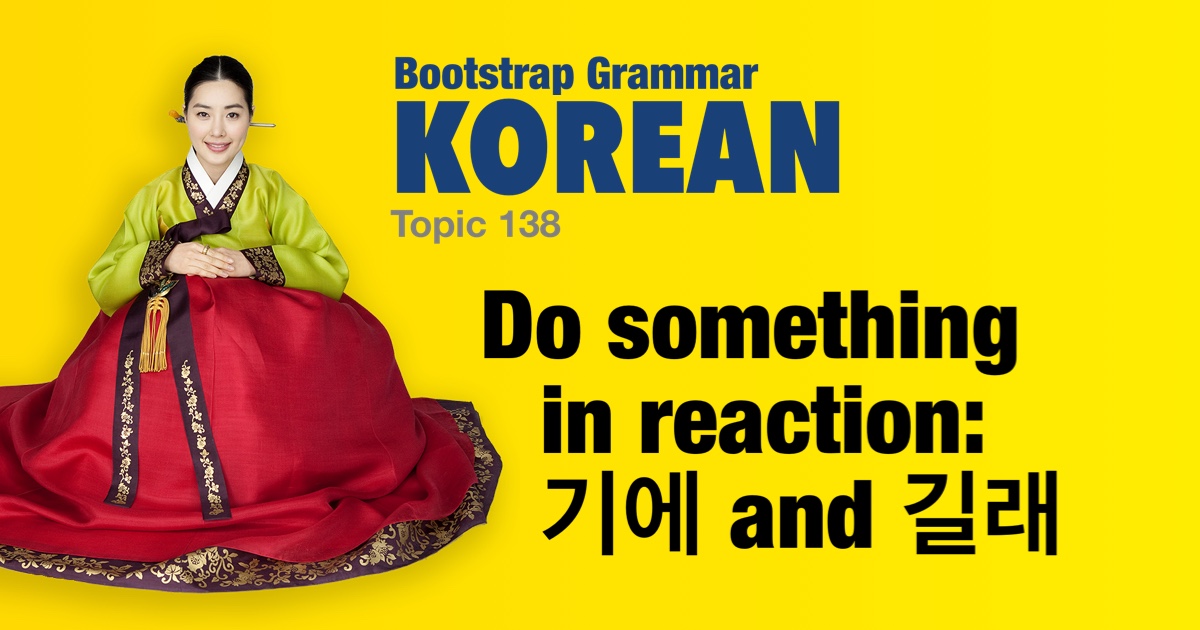Korean grammar - Do something in reaction: 기에 and 길래 |
|||
|
|||
The Verb ending 기에 expresses that one does an action because of the prior clause. And the prior clause is something seen or experienced by the speaker. But the reason or cause arises from someone or an external situation that has no relation to the speaker’s will or intention. So the English equivalent is 'because' or 'so' although with a lot more nuance. The ~아/어서 pattern which also has a similar meaning is more general then 기에 and 길래 - the latter imply the causation is the speaker personal experience. The ending 길래 is a more colloquial form of 기에 and much more common. |
| Examples: | |
|
비가 오길래 우산을 가져왔어요.
It was raining so (I) brought my umbrella.
|
|
|
맛있길래 더 사 왔어요.
It was delicious so (I) bought (and took home) some more.
|
|
|
사람이 많길래 그냥 나왔어요.
There were a lot of people so (I) just left.
|
|
|
너무 피곤하길래 그냥 집에 있었어요.
(I) was too tired, so (I) just stayed at home
|
|
|
사과가 싸길래 한 박스 사 왔어요.
(I) bought a box of apples because they were cheap.
|
|
|
누군가 길을 묻길래 알려주고 오느라 늦었어요.
(I) was late because someone asked for directions, so I answered. |
|
|
꽃이 많이 피어있길래 좀 꺾어왔어요.
There were a lot of flowers in bloom, so (I) picked some. |
|
|
하윤이가 저를 부르길래 뒤를 돌아보았어요.
Hayun called me, so (I) turned around.
|
|
|
쿵 하는 소리가 들리길래 밖에 나가서 살펴보았죠.
(I) heard a thump, so (I) went outside and looked around. |
|
|
길에 지갑이 떨어져 있길래 경찰서에 갖다 줬어요.
A wallet dropped on the road, so (I) took it to the police station. |
|
|
우리는 인간이기에 사회적인 교제가 필요해요.
Because we are humans, (we) need social interaction.
|
|
|
독감 주사가 필수라고 하길래 저도 맞았어요.
(They) said that a flu shot was required, so I also got it. |
|
|
방충망이 망가졌길래 아빠에게 고쳐 달라고 부탁했어요.
The screen was broken, so (I) asked (my) dad to fix it. |
|
|
그 식당에 사람이 많길래 다른 식당에 갔어요.
There were a lot of people in that restaurant, so (we) went to another restaurant. |
|
|
세일기간이길래 샀어요.
(I) bought (it) because (it) was on sale. |
|
|
무슨 일이 있었길래 기분이 이렇게 안 좋아요?
What happened to make (you) feel so bad? |
|
|
배를 아주 싸게 팔길래 많이 샀어요.
The pears were selling very cheaply so (I) bought a lot. |
|
|
친구들이 너무 늦게 왔길래 화를 냈어요.
(My) friends came too late so (I) got angry because |
|
|
비가 올 것 같길래 그냥 집에 있었어요.
It looked like it was going to rain, so (I) just stayed at home. |
|
|
서점이 곧 문을 닫을 것 같길래 그냥 돌아왔어요.
The bookstore looked like it was going to close soon so (I) just came back |
|
|
지금 어디에 있길래 이렇게 시끄러워요?
Where are (you) now? It’s so noisy (as a result of that)!
|
|
|
뭘 했길래 이렇게 지쳤어요?
What did (you) do to be so tired?
|
|
|
경화 씨가 뭐라고 말했길래 이렇게 신났어요?
What did Kyunghwa say to make (you) so excited? |
|
|
무슨 이야기를 들었길래 그렇게 열심히 공부해요?
What did (you) hear that made (you) study so hard? |
|
|
어디에 가길래 그렇게 짐을 많이 싸요?
Where are (you) going that (you) are packing so much stuff? |
|
|
누구를 만나길래 그렇게 화장을 열심히 해요?
Who are (you) meeting to be putting on so much make-up? |
|
 |
|


 The cause was rain - experienced by the speaker but not by the will of the speaker
The cause was rain - experienced by the speaker but not by the will of the speaker
